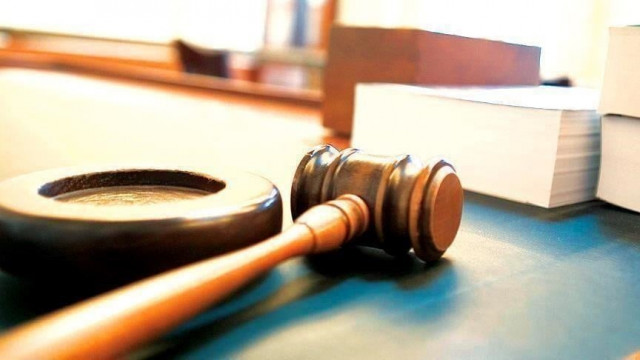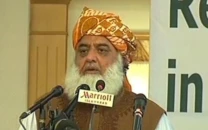Efforts to avoid ‘ugliness’ in JCP huddle
No judge has been appointed to the SC since February this year

The two government representatives in the Judicial Commission of Pakistan (JCP) on Tuesday held a meeting with other members, especially its chairman, Chief Justice of Pakistan Umar Ata Bandial, to request them to avoid any unpleasant scene during Wednesday’s (today) meeting wherein the body would consider the confirmation of 13 additional judges of the Lahore High Court.
Both Law Minister Azam Nazeer Tarar and Attorney General for Pakistan (AGP) Ashtar Ausaf Ali met JCP members, who belonged to both camps within the commission.
One government representative in the JCP told The Express Tribune the tenure of these LHC judges was ending next month. The JCP members are divided on the appointment of judges.
An unpleasant scene was witnessed during the JCP meeting on July 28 this year, wherein CJP Bandial’s nominees for elevation to the SC could not be approved.
Later a series of letters was started. Justice Qazi Faez Isa, Justice Sardar Tariq Masood and Justice Syed Mansoor Ali Shah wrote letters to CJP Bandial urging him to summon a meeting of the JCP to consider the appointment of five SC judges.
No judge has been appointed to the SC since February this year.
On the SC judges’ appointment, one government representative in the JCP revealed that they would make a decision on the matter on the instructions of the federal government.
The same instructions were conveyed to other JCP members.
Sources revealed that CJP Bandial has again initiated consultations with JCP members on the elevation of five high court judges to the SC.
It is likely that the majority of the JCP members will agree on the elevation of three high court judges to the SC.
The CJP might consider Islamabad High Court Chief Justice Athar Minallah for elevation to the SC.
However, the biggest challenge for the JCP is on the nomination of Sindh High Court judges’s elevation to the SC.
It is likely that two SHC judges will be elevated to the SC.
The situation is really tense at the SHC after the elevation of its junior judges to the SC.
There is frustration among senior SHC judges.
Justice Sarmad Jalal Osmani, who is a member of the JCP, had raised questions about why SHC judge Justice Aqeel Abbasi was not being nominated for his appointment as an SC judge.
Justice Isa and Justice Masood are consistently advocating that the seniority principle should be followed for the appointment of top court judges until objective criteria are evolved.
The Pakistan Bar Council (PBC) representative in the JCP is also supporting this view.
A senior lawyer, however, believes that in order to break the impasse, JCP members should find out a middle way to end the crisis on judges’ appointment.
He says that if both government representatives are playing a reconciliatory role, then it should be appreciated.
First, the regime change has severely affected the CJP’s position in the JCP.
Earlier during the PTI-led government’s tenure, two JCP members – the law minister and AGP – were always inclined to support the CJP’s junior high court nominees for their elevation to the top court.
This happened in the appointment of Justice Muhammad Ali Mazhar and Justice Ayesha Malik.
However, the situation dramatically changed as two representatives of the incumbent government – the law minister and AGP – are supporting the bar’s view on judges’ appointment.
There could be many reasons for it. The incumbent law minister, Azam Nazeer Tarar, is an active member of bar politics.
Similarly, the superior bars have an important role in bringing the incumbent regime into power.
It has also been witnessed that the judicial proceedings in a few cases including the suo motu notice on the alleged interference in the affairs of investigation and prosecution departments in high-profile cases as well as the SC’s refusal to form a full court to decide the then Punjab Assembly deputy speaker’s ruling have irked the current PML-N-led federal government.
Senior lawyers say that if the SC had not rejected the plea for the composition of a full court, then the situation might have been different during the JCP meeting held on July 28.
After analysing the outcome of the JCP meetings, it is clear that there are two views within the commission.
One view is represented by CJP Bandial and Justice Ijazul Ahsan that is not in favour of adhering to the seniority principle for the SC judges’ appointment. They believe that appointments should be based on competence, efficiency, integrity and temperament.
The other view is reflected in Justice Isa and Justice Masood’s opinions on the matter.



















COMMENTS
Comments are moderated and generally will be posted if they are on-topic and not abusive.
For more information, please see our Comments FAQ